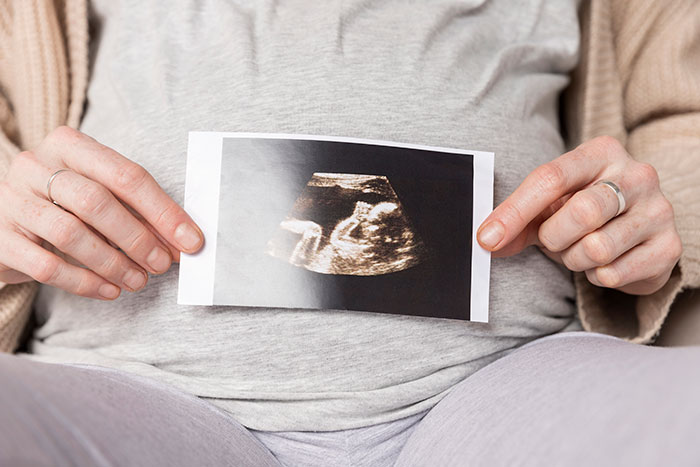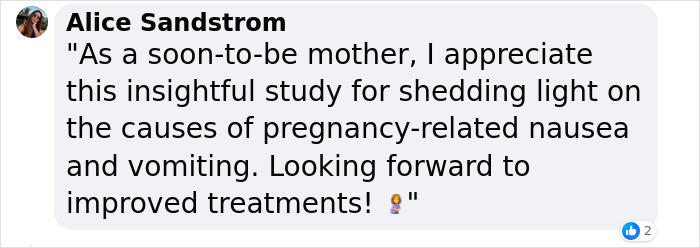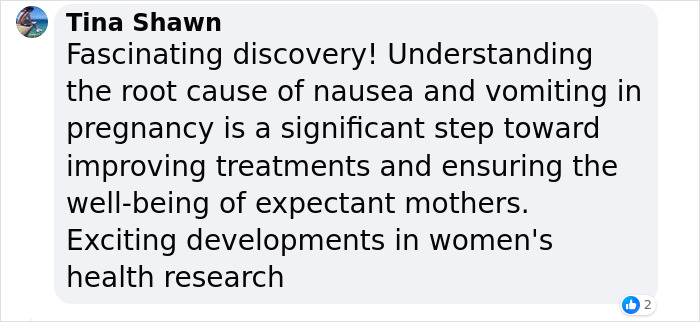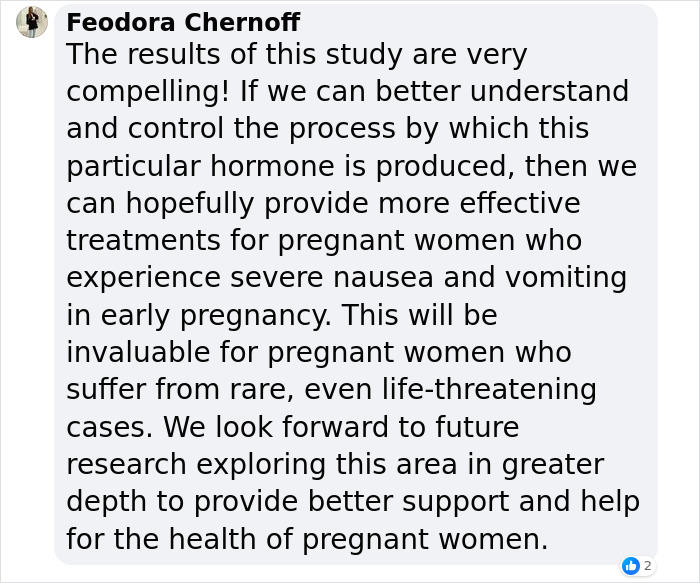Ever since humanity started, women have endured inexplicable menstrual pains, debilitating migraines, and other hormonal conditions that have been normalized in our society.
In more recent times, many of these conditions have been explained, but one uncomfortable state has remained a mystery: morning sickness.
But today we have good news, as we can now finally explain the nausea and vomiting roughly 70% of people experience during pregnancy.
According to a study published in the journal Nature on Wednesday (December 13), the nausea and vomiting that often define the first trimester of pregnancy are primarily caused by a single hormone: GDF15.
The nausea and vomiting that often define the first trimester of pregnancy are primarily caused by a single hormone: GDF15

Image credits: senivpetro
Researchers found that the amount of this hormone circulating in a woman’s blood during pregnancy — as well as her exposure to it before pregnancy — drives the severity of her symptoms, as per the New York Times.
More than two-thirds of pregnant people experience nausea and vomiting during the first trimester, with roughly two percent of pregnant people getting hospitalized for a condition called hyperemesis gravidarum, which causes relentless vomiting and nausea throughout the entire pregnancy, as per the publication.
The condition can lead to malnutrition, weight loss, and dehydration, but also increases the risk of preterm birth, pre-eclampsia, and blood clots, threatening the life of the mother and the fetus.
With the discovery, however, researchers have reportedly said this could lead to better treatments for morning sickness, including the rare and sometimes life-threatening cases of it.
More than two-thirds of pregnant people experience nausea and vomiting during the first trimester

Image credits: MART PRODUCTION
Dr. Marlena Fejzo, a geneticist at the University of Southern California Keck School of Medicine and a co-author of the new study, told the Times: “I’ve been working on this for 20 years and yet there are still reports of women dying from this and women being mistreated.”
Marlena has reportedly experienced the condition firsthand with her second pregnancy, in 1999.
She reportedly experienced being unable to eat or drink without vomiting, and subsequently rapidly lost weight, becoming too weak to stand or walk.
Her doctor was dismissive, suggesting she was exaggerating her symptoms to get attention. She was eventually hospitalized and miscarried at 15 weeks, as per the publication.
Marlena reportedly asked the National Institutes of Health to fund a genetic study of hyperemesis but was rejected. Nevertheless, the perseverant doctor convinced 23andMe, a popular genetic testing company, to include questions about hyperemesis in surveys of tens of thousands of customers.
As a result, Marlena published a paper in 2018 displaying that customers with hyperemesis tended to carry a variant in a gene for GDF15.
Roughly two percent of pregnant people are hospitalized for a condition called hyperemesis gravidarum

Image credits: freepik
Tito Borner, a physiologist at the University of Pennsylvania, told Nature: “For the first time, hyperemesis gravidarum could be addressed at the root cause, rather than merely alleviating its symptoms.”
Stephen O’Rahilly, a metabolism researcher at the University of Cambridge, UK, and the study’s co-author added: “We now have a clear view of what may cause this problem and a route for both treatment and prevention.”
As per the publication, the findings suggest that giving GDF15 to those at high risk of hyperemesis gravidarum before pregnancy could protect them from debilitating conditions.
Nevertheless, Stephen also clarified that their study suggested that other factors might also influence the risk of severe sickness.
The study could lead to better treatments for morning sickness

Image credits: senivpetro
Research has shown that GDF15, which is produced at low levels by organs including the prostate, bladder, and kidneys, can trigger nausea by binding to specialized receptors in the brainstem, as per Nature.
Moreover, after ingesting toxic substances and during early pregnancy, levels of this hormone increase, causing sickness. “It’s usually worst in the first trimester and then it gradually fades,” Stephen said.
Stephen proposed in the new study that GDF15 might have evolved to protect people from poisoning themselves and to shield a developing fetus from toxic substances.
It’s not necessary to eat a lot and gain much mass in early pregnancy, the researcher explained. He further stated: “It’s far better off being cautious about what you eat, to protect your offspring from toxins.”
Many people were “grateful” for the research

In 2018, researchers linked some variants of the GDF15 gene, which encodes GDF15, to an increased risk of developing hyperemesis gravidarum, Nature reported.
But in the new study, Stephen and his colleagues reportedly found that GDF15 levels in the blood were substantially higher in nearly 60 pregnant people who experienced nausea and vomiting than in around 60 who had little or no sickness.
Subsequently, further tests and results suggested that higher levels of GDF15 in non-pregnant people reduced the risk that they would develop hyperemesis gravidarum if they did become pregnant.
Moreover, the study found that people react less to the hormone during pregnancy if they have higher GDF15 levels beforehand.
After testing this idea with mice and humans, results suggested that people who have generally low levels of GDF15 could be given increasingly high doses of the hormone while trying to conceive, to desensitize them to it and reduce their chances of experiencing hyperemesis gravidarum during pregnancy.
Other people shared their own experiences with morning sickness

Alternatively, they could be given antibodies that block GDF15 or GDF15 receptors, to reduce nausea and vomiting, as per the publication.
At least two antibodies against GDF15 are reportedly being tested in clinical trials to treat the wasting syndrome cachexia.
Catherine Williamson at Imperial College London said: “We don’t know anything about the role of GDF15 in normal pregnancy.” As a result, Catherine has revealed that studies should establish whether changing the hormone’s activity might have harmful side effects.
Many thought the study was “insightful”



















 English (US) ·
English (US) ·